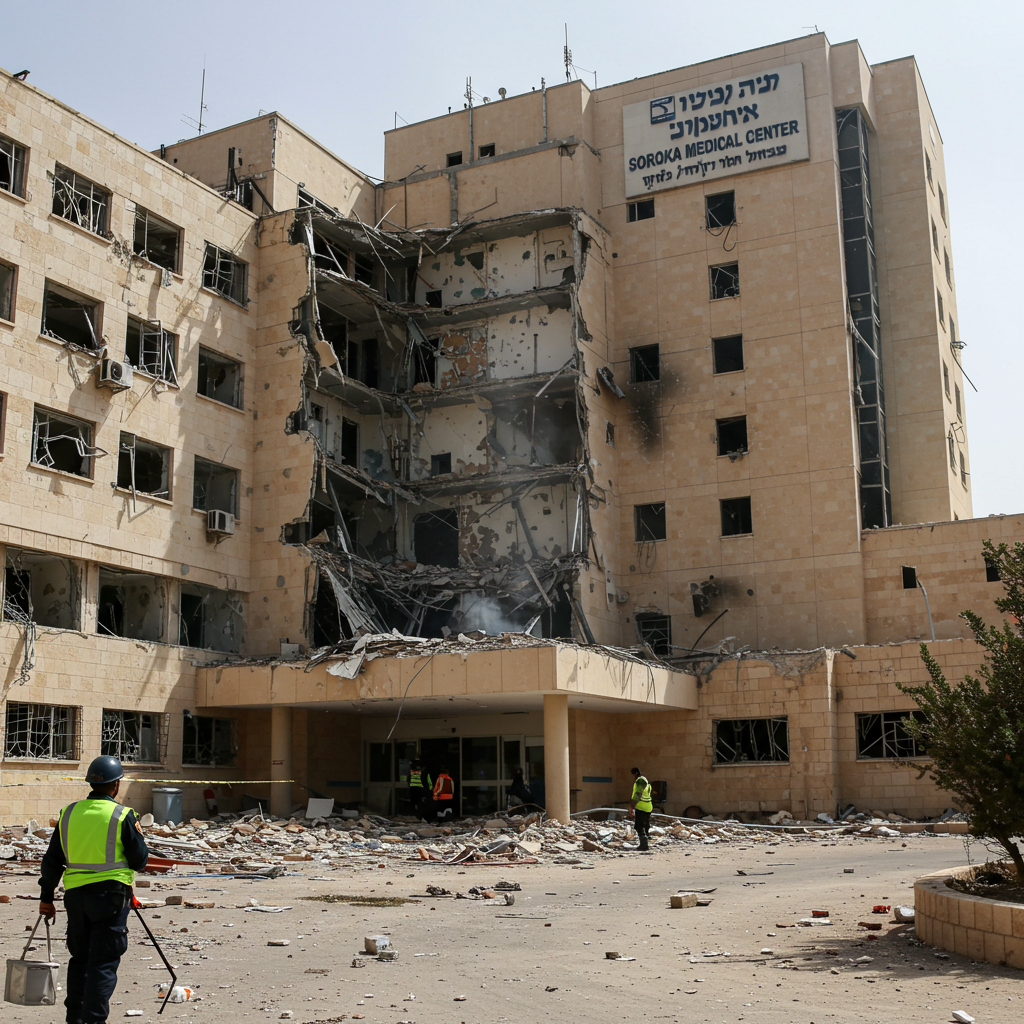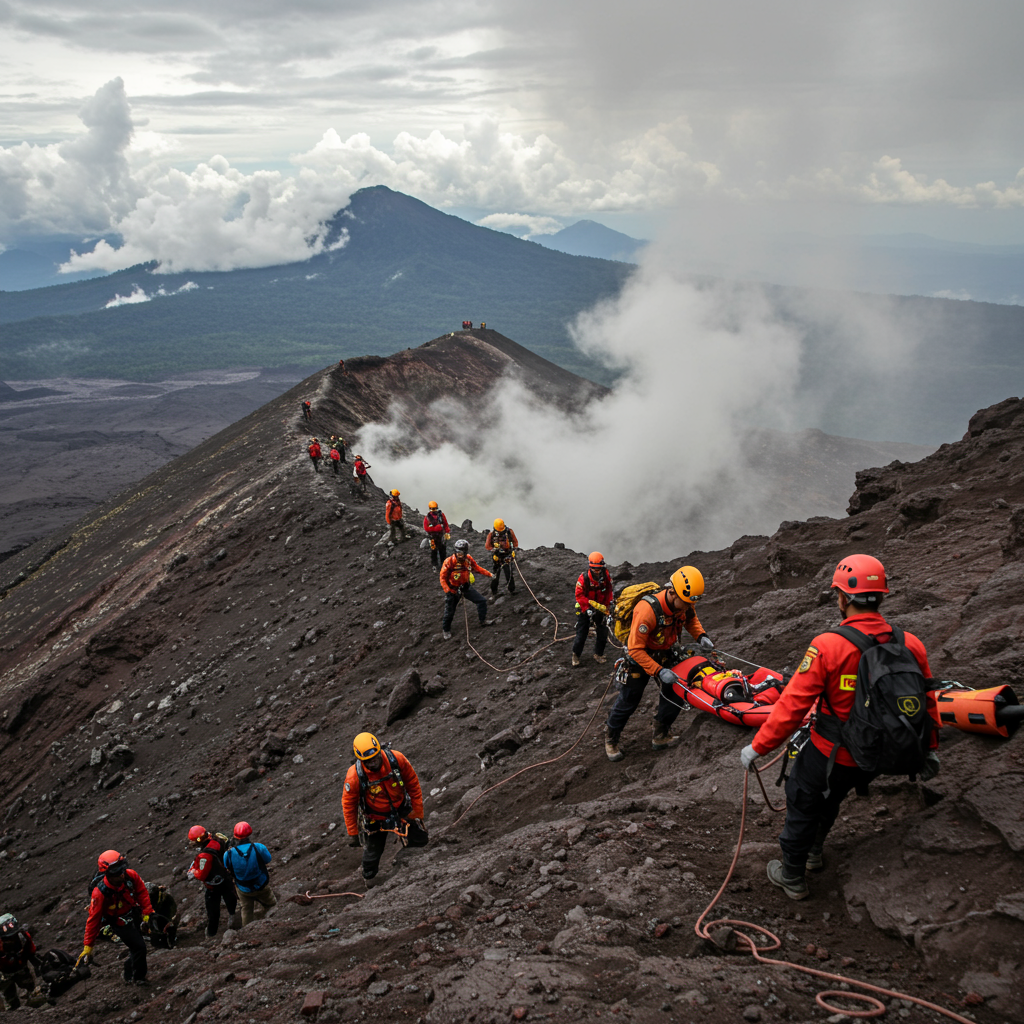Escalation in Israel-Iran Conflict: Hospital Struck, Threats Exchanged
BEERSHEBA, Israel – Amidst an intensifying week-long conflict, an Iranian missile struck a major Israeli hospital in Beersheba on Thursday morning. The attack caused significant damage to Soroka Medical Center, resulting in minor injuries and immediately drawing stern vows of retribution from Israeli officials.
The missile impacted the hospital’s surgery department shortly after 7 a.m. The blast ignited a fire and shattered windows across the complex. Hospital officials reported approximately 80 people suffered minor injuries, primarily from flying glass and debris. Fortunately, the targeted wing had been evacuated earlier, preventing mass casualties. Joseph Kushnir, a psychiatrist on his way to work, described the scene as “total chaos” upon arrival, seeing thick black smoke rising from the building. Around 700 patients were at the hospital at the time of the strike, with about 300 remaining afterward.
Iran’s state news agency, IRNA, claimed the intended target was a nearby military technology facility and an intelligence camp located about a mile from the hospital. Israeli media had previously reported plans to move thousands of IDF technological personnel to a new hub in the area, near an existing military school for software and cyberdefense.
Beyond Beersheba, other areas in central Israel, including Ramat Gan and Holon, were hit in the same early barrage. These strikes damaged residential buildings and injured dozens, some seriously. The Israeli military stated Iran used a cluster munition – a missile designed to disperse smaller explosives over a wide area – and warned civilians about unexploded ordnance.
Israel Condemns Hospital Attack, Threatens Iranian Leadership
Israeli officials vehemently condemned the strike on Soroka Medical Center as evidence of Iran’s intent to target civilians. Prime Minister Benjamin Netanyahu, visiting the damaged hospital, drew a stark contrast: “We are striking nuclear and missile targets with precision, and they hit a children’s ward in a hospital. That says it all.” IDF spokesman Brig. Gen. Effie Defrin added, “They are aiming to kill as many civilians as they can. This is exactly why we launched this operation.”
In a significant escalation of rhetoric, Defense Minister Israel Katz directed the military to “intensify strikes against strategic targets in Iran and government sites in Tehran” in retaliation. Katz explicitly stated that Iran’s supreme leader, Ayatollah Ali Khamenei, would be held accountable, declaring Khamenei “should not continue to exist.” However, US officials later indicated that President Donald Trump had vetoed an Israeli proposal to assassinate Khamenei, with Trump confirming no immediate plans for such an action, highlighting complex dynamics between the allies.
Wider Conflict Landscape
The missile strike on Beersheba occurred within the context of a broader, escalating conflict initiated by Israeli airstrikes on Iranian targets the previous week. This tit-for-tat has seen hundreds reportedly killed and fears of wider regional war mount.
Israeli forces have conducted extensive operations, including major overnight strikes across Tehran involving over 60 fighter jets targeting approximately 120 military industrial sites involved in missile production and key nuclear R&D facilities like the Spand headquarters, linked to figures like Mohsen Fakhrizadeh. These strikes aim to disrupt Iran’s nuclear weapons program and retaliatory capabilities. Israel estimates it has destroyed two-thirds of Iran’s missile launchers over the past week. While Israel claims precision targeting, Iranian state media has reported civilian casualties, including women and children, from Israeli strikes targeting military leaders.
The conflict carries significant risk of drawing in regional proxies like Hezbollah and Hamas, potentially opening multiple fronts and further destabilizing a Middle East already grappling with crises, including the devastating conflict in Gaza.
International Pressure and Diplomatic Efforts
The escalating violence has spurred international diplomatic efforts. US President Donald Trump is reportedly weighing direct US military intervention, setting a two-week window for his decision and reportedly considering striking Iran’s heavily fortified Fordo nuclear facility.
Simultaneously, a potential diplomatic channel has opened. European foreign ministers are scheduled to meet with Iran’s foreign minister in Geneva, aiming to de-escalate the conflict and revive nuclear negotiations. British officials have noted that a “window now exists within the next two weeks to achieve a diplomatic solution,” aligning with the timeline set by Trump’s decision period.
Meanwhile, verifying the full impact of strikes in Iran has been hampered by a near-total internet blackout, which Tehran claims was imposed to interfere with Israel’s targeting systems. The volatile situation underscores the high stakes as regional tensions threaten to boil over into a wider confrontation.



